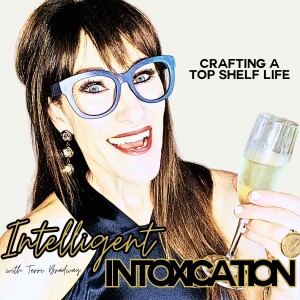
Wednesday Dec 13, 2023
Your Mental Health Is Your Responsibility -Part 5
My new book Intentional Intoxication: How To Deliberately Distill The Different Life You Desire, is available on Amazon. You can imbibe on the entire book in one, short, intentionally happier hour:
Today is PART 5 of the Intentional Intoxication mini-course, created to help you apply what you’ve learned from the book in your actual life.
While it’s not your fault that you may struggle with depression or anxiety, it is your responsibility to manage your mental, physical, and emotional health.
Courtesy of UCLA Health:
What's the difference between a bad case of the blues and the painful mental disorder known as depression? According to the experts, impaired functioning is usually a clear-cut indication of a major depression.
Here's a quick checklist of depression symptoms. If the list sounds familiar, you may want to see a counselor or a psychiatrist.
- Depressive mood. Do you suffer from feelings of worthlessness, helplessness, or pessimism for days at a time?
- Sleep disturbance. Do you have trouble falling asleep at night or trouble staying asleep—waking up in the middle of the night or too early in the morning? Are you sleeping too much?
- Chronically fatigued. Do you frequently feel tired or lack energy?
- Isolation. Have you stopped meeting with family or friends? Increasing isolation and diminished interest or pleasure in activities are major signs of depression.
- Appetite disturbance. Are you eating far less than usual—or far more? Severe and continuing appetite disturbance is often an indication of depression.
- Inability to concentrate. If you can't seem to focus on even routine tasks, it's probably time to get some help.
- Dependence on mood-altering substances. If you depend on alcohol or other drugs to make it through the day, you may be suffering from depression. Often, the substance abuse causes symptoms that mimic the appearance of clinical depression, but are, in fact, due wholly to the drug use.
- Feeling a sense of inappropriate guilt
- Recurrent thoughts of death or suicide or a suicide attemptChecklist for depression
Courtesy of the Mayo Clinic, common anxiety signs and symptoms include:
- Feeling nervous, restless or tense
- Having a sense of impending danger, panic or doom
- Having an increased heart rate
- Breathing rapidly (hyperventilation)
- Sweating
- Trembling
- Feeling weak or tired
- Trouble concentrating or thinking about anything other than the present worry
- Having trouble sleeping
- Experiencing gastrointestinal (GI) problems
- Having difficulty controlling worry
- Having the urge to avoid things that trigger anxiety
I invite you to consider these questions:
- How willing are you to:
- seek out help for depression or anxiety?
- take responsibility for managing the diagnosis and treatment of your mental health?
Here is a link to an on-line resource for counseling:
To grab a copy of my book, click below:
I invite you to click on the link below to book a complimentary happy hour call with me. I’d love to hear about you and offer you the help and support you might want.
For a quick shot of your life’s current level of intoxication, I invite you to complete the 10 Questions on my Intoxication Inventory:
No comments yet. Be the first to say something!